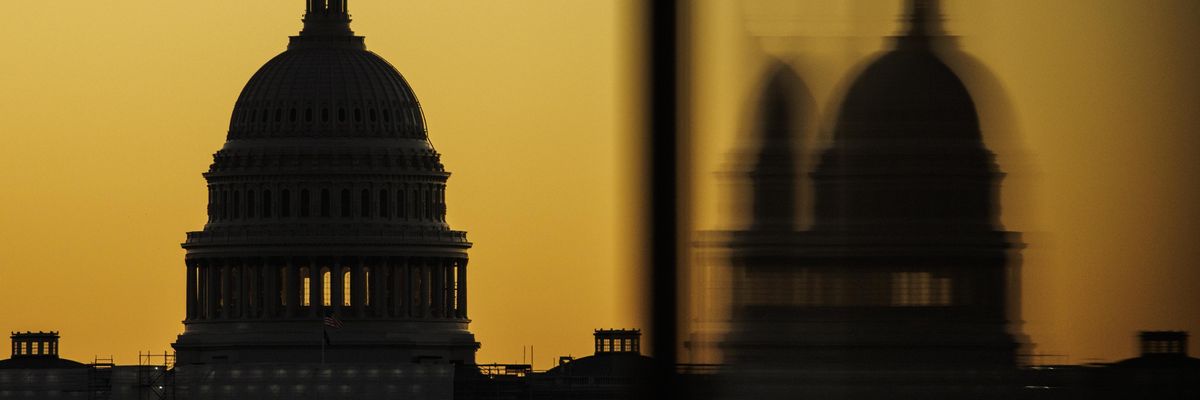The midterms have largely gone off without much of a hitch. But election deniers and those seeking to suppress the votes of opponents have proven they won't take that sitting down.
Regardless of how the races for congressional seats shake out when the vote tallies conclude, the majority of Congress's GOP caucus will still be made up of 2020 election deniers.
Tuesday lacked the widespread protests, major disruptions, rampant voter intimidation or even violence that some feared would unfold at the polls. But don't think the threat of voter suppression is over. It's just getting started--for this election, as well as for 2024.
Florida is a case study for how it'll be done. If the reelection of Governor Ron DeSantis, one of the most high-profile embracers of 2020 election denialism, wasn't enough to spur fear that efforts to upend elections will continue, then his move to block federal election monitors from entering polling places in the Sunshine State should. The Department of Justice dispatched monitors to 64 election districts in 24 states--including Broward, Miami-Dade, and Palm Beach counties in Florida--to ensure compliance with federal voting laws. (Eight Massachusetts communities were also included in that monitoring.) It's nothing new; federal officials have monitored elections since the Voting Rights Act was passed in 1965.
But in Florida, as well as in Missouri, Republican state officials refused to let monitors inside polling places, citing state law. But federal law trumps state law. Still, given the Supreme Court's decade-long effort to pull every tooth out of the Voting Rights Act's enforcement powers, DeSantis and others are more emboldened to flout that law than ever. Just consider how successfully he and the Florida GOP gerrymandered election districts to dilute Black Floridians' voting power.
There were some signs of more traditional voter suppression efforts this week, like in Texas, where Black voters were shadowed or asked to say their addresses aloud even after they were checked in by polling officials--a move some voters said put them in fear of retaliation. It took an emergency legal challenge by a local NAACP chapter and resulting court order to allow voters to cast their ballots without interference.
But it was clear even before the polls opened Tuesday that the main voter suppression tools of choice would be baseless legal claims and disinformation.
It began weeks ago when many of the same voting districts that proved pivotal in the 2020 presidential election and were subsequently targeted by Donald Trump and other election-denying Republicans were the subject to more frivolous challenges. In Michigan, a ham-handed effort by GOP secretary of state candidate Kristina Karamo to stop absentee ballots that were not obtained in person from being counted, but--wait for it--only in Detroit, was tossed out of court before Election Day. But according to a New York Times report, another more organized effort by GOP officials, activists, and lawyers in that state has been underway for months, with the aid of people like Cleta Mitchell, known for being a central player in Trump's plan to interfere with the 2020 election in Georgia.
While similar GOP legal attacks on balloting in Philadelphia didn't prevent big statewide wins for Democrats in Pennsylvania, officials there still worry that it will be enough to plant seeds of doubt to sow groundless allegations of election fraud.
On top of all of this, Trump and others are still pushing election-fraud lies on social media. Trump used his Truth Social account to make a false claim about absentee ballot fraud in Michigan, which ended with the directive: "Protest, Protest, Protest."
That drew a Twitter retort and a fact check from the state's top election official. "Hi again," Michigan Secretary of State Jocelyn Benson tweeted with a waving hand emoji. "This isn't true. Please don't spread lies to foment or encourage political violence in our state. Or anywhere. Thanks."
Benson beat Karamo in Michigan, and overall, other election deniers running for offices that oversee elections in states across the country didn't fare well.
But regardless of how the races for congressional seats shake out when the vote tallies conclude, the majority of Congress's GOP caucus will still be made up of 2020 election deniers. Don't think they will stop there--especially if Trump declares another presidential bid and comes out from the social media shadows and his election lies, once again, dominate the political discourse.

